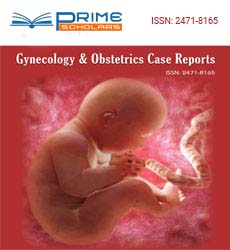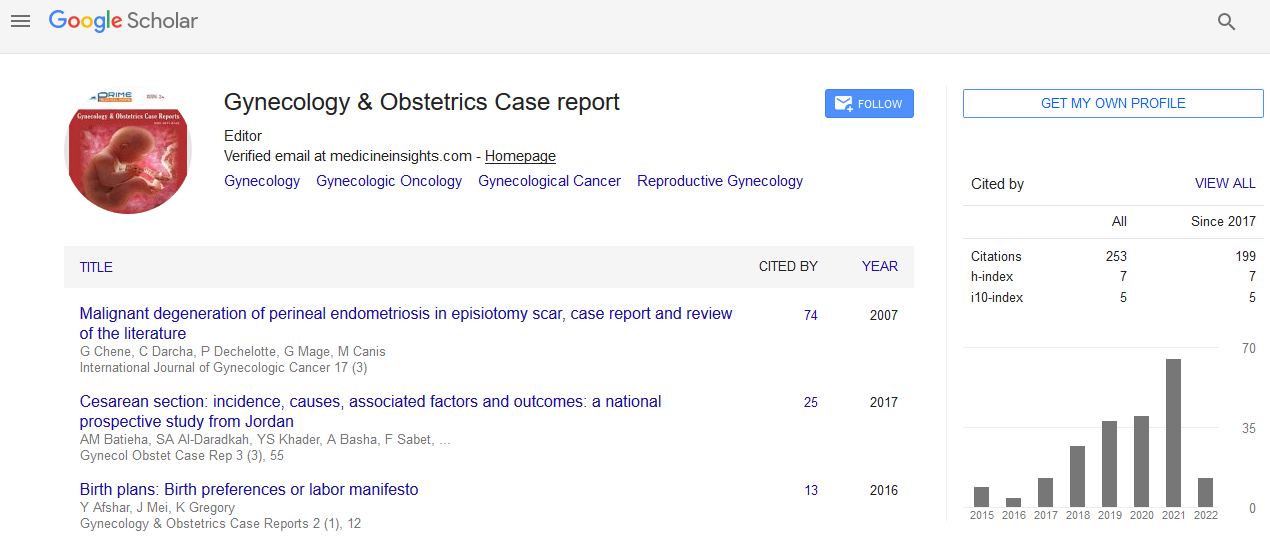Mini Review - (2023) Volume 9, Issue 4
Gynecological Health: Navigating the Complex Landscape of Women's Well-being
Marwan Ahmed*
Department of Gynecology, University of Pretoria, Pretoria, South Africa
*Correspondence:
Marwan Ahmed, Department of Gynecology, University of Pretoria, Pretoria,
South Africa,
Email:
Received: 28-Jun-2023, Manuscript No. ipgocr-23-17567;
Editor assigned: 30-Jun-2023, Pre QC No. IPGOCR-23-17567 (PQ);
Reviewed: 11-Jul-2023, QC No. IPGOCR-23-17567 (Q);
Revised: 18-Jul-2023, Manuscript No. IPGOCR-23-17567 (R);
Published:
27-Jul-2023, DOI: 10.36648/2471-8165.9.4.25
Abstract
Gynecological health, a fundamental aspect of overall well-being, encompasses a range of issues unique to
individuals with female reproductive systems. From adolescence to menopause and beyond, women's bodies
undergo a series of intricate changes that require specialized care and attention. Gynecological issues cover a
wide spectrum, from menstrual irregularities and reproductive health concerns to conditions affecting the pelvic
region. Addressing these matters not only improves quality of life but also empowers women to take charge of
their bodies and make informed decisions about their health. One of the cornerstones of gynecological health is
menstrual health. The menstrual cycle, a natural process involving hormonal fluctuations, prepares the body for
potential pregnancy. However, it is not uncommon for women to experience irregular periods, painful cramps, or
heavy bleeding. These issues can be indicative of underlying health conditions such as Polycystic Ovary Syndrome
(PCOS), endometriosis, or uterine fibroids. Recognizing these symptoms and seeking medical attention is crucial
for accurate diagnosis and appropriate management.
Keywords
Gynecological health; Fertility; Menstrual cycle
Introduction
Gynecological health significantly intersects with
reproductive health. For women desiring to start a family,
fertility plays a pivotal role. Fertility-related challenges can
emerge due to various factors, including hormonal imbalances,
age, or structural abnormalities. Assisted reproductive
technologies like In Vitro Fertilization (IVF) offer hope to those
facing infertility. It's essential for women to have access to
comprehensive information about their reproductive options,
allowing them to make decisions that align with their life
goals and aspirations. Pelvic health, often a topic shrouded in
silence, is another crucial aspect of gynecological well-being.
Conditions such as urinary incontinence and pelvic organ
prolapse can significantly impact a woman's quality of life.
These issues can arise due to factors like childbirth, hormonal
changes, or even genetics. Initiating conversations about pelvic health helps eliminate stigma and encourages individuals to
seek medical advice without hesitation. Pelvic floor exercises
and, in some cases, surgical interventions can provide relief and
restore pelvic function [1].
Literature Review
Two prominent chronic gynecological conditions that
deserve special attention are endometriosis and Polycystic Ovary
Syndrome (PCOS). Endometriosis involves the abnormal growth
of tissue resembling the uterine lining outside the uterus. It can
lead to severe pain, infertility and other complications. PCOS,
on the other hand, is characterized by hormonal imbalances
that can result in irregular periods, weight gain and fertility
issues. Both conditions require multidisciplinary approaches
involving medical professionals, dieticians and mental health
experts to manage symptoms effectively. As women approach
menopause, typically around their late 40s to early 50s, their bodies undergo significant hormonal shifts, marking the end of
their reproductive years. Menopause brings about a unique set
of challenges, including hot flashes, mood swings and changes
in bone density. While this transition is natural, its effects can be
managed through lifestyle adjustments, hormone replacement
therapy and regular medical check-ups [2].
Discussion
Open conversations about menopause ensure that women
are well-prepared and informed about what to expect during
this phase. Education and empowerment are paramount
when it comes to gynecological health. Comprehensive sexual
education equips individuals with accurate information about
their bodies, safe practices and the importance of seeking
medical help when needed. Empowering women to advocate
for their health, ask questions and challenge taboos helps break
down barriers to proper care. Access to gynecological care varies
significantly around the world. Socioeconomic factors, cultural
norms and geographic location can create barriers to adequate
healthcare. Addressing these disparities requires collaborative
efforts from governments, healthcare institutions and advocacy
groups. Telemedicine and digital health platforms have shown
promise in extending expert advice to remote areas, ensuring
that women everywhere can access the care they deserve.
Advancements in medical research and technology continue
to shape the landscape of gynecological health. From noninvasive
diagnostic tools to innovative treatments, the future
holds promise for more personalized and effective approaches.
However, progress also depends on increased awareness,
continued research funding and ongoing conversations that
challenge stigma and misinformation [3,4].
Gynecological issues encompass a vast range of conditions
that affect women's reproductive health, including menstrual
disorders, pelvic pain, fertility challenges, Sexually Transmitted
Infections (STIs), uterine fibroids, endometriosis, Polycystic
Ovary Syndrome (PCOS) and gynecological cancers. Each
condition presents unique symptoms, causes and treatment
approaches, making it imperative for healthcare professionals
to adopt a holistic approach to care. Moreover, the intersection
of cultural, socioeconomic and geographical factors can further
complicate the experience and treatment of these issues,
highlighting the need for personalized and culturally sensitive
healthcare.
Gynecological issues often come with physical discomfort,
emotional distress and social stigma. Many women experience
painful menstrual periods, often brushed aside as a normal part
of womanhood. Conditions like endometriosis, characterized by
the growth of tissue outside the uterus, can cause excruciating
pain and lead to fertility problems. However, due to a lack of
awareness, many women suffer in silence and endure delays in
diagnosis and treatment. Additionally, the stigma surrounding
discussions of reproductive health can prevent open
conversations and discourage women from seeking medical
help. Breaking the silence surrounding gynecological issues
requires a multifaceted approach. Education plays a pivotal role
in empowering women to recognize the signs and symptoms
of various conditions, thereby enabling early intervention.
Schools, healthcare providers and community organizations should collaborate to provide accurate information about
reproductive health and debunk myths. Open conversations
about menstruation, sexual health and conditions like PCOS and
endometriosis can help dispel stigma and foster a supportive
environment for women to seek help without embarrassment.
Efforts to empower women in managing their gynecological
health extend to accessible and comprehensive healthcare
services. Regular gynecological check-ups should be promoted
to facilitate early detection and prevention. Access to
affordable healthcare services, particularly in underserved
communities, is crucial in ensuring that no woman is denied
the right to proper reproductive care. Telemedicine and digital
health platforms can bridge geographical gaps and offer
women a means to consult healthcare providers discreetly.
The medical community's commitment to understanding
gynecological issues and improving treatment options has led
to significant advancements. Researchers are uncovering the
genetic, hormonal and environmental factors contributing to
conditions like endometriosis and PCOS. Tailored treatment
plans, including medication, minimally invasive procedures and
lifestyle changes, are increasingly being developed to address
individual needs. Collaborative efforts between healthcare
professionals, researchers and patient advocacy groups are
driving innovation and improved quality of life for those
affected [5,6].
It's essential to recognize that gynecological issues are not
confined to any specific region or culture. However, the way
these issues are perceived and addressed can vary greatly
across societies. Cultural norms and taboos can hinder open
conversations and access to care. Addressing gynecological
health from a global perspective involves acknowledging these
differences while working toward universal access to accurate
information and quality healthcare. Conversations about
gynecological issues should not be limited to women alone.
Men play a crucial role as partners, family members and friends
in supporting women's reproductive health. Inclusive education
and awareness campaigns can help men better understand the
challenges women face and encourage them to be empathetic
allies. By involving men in these discussions, we create a more
supportive and informed environment that benefits everyone.
Conclusion
In conclusion, gynecological health encapsulates a diverse
range of issues that affect individuals with female reproductive
systems. From menstrual health to reproductive concerns,
pelvic well-being, chronic conditions and the transition into
menopause, women's bodies undergo significant changes
that require specialized care. Education, empowerment and
access to care are crucial in addressing gynecological issues
and ensuring that women lead healthy and fulfilling lives. By
fostering open dialogues and embracing advancements, society
can pave the way for a future where gynecological health is
universally understood, respected and prioritized.
Acknowledgement
None.
Conflict of Interest
The author has no conflicts of interest to declare.
References
- Madjunkov M, Dviri M, Librach C (2020) A comprehensive review of the impact of COVID-19 on human reproductive biology, assisted reproduction care and pregnancy: A Canadian perspective. J Ovarian Res 13(1):1-8.
[Google Scholar], [Crossref], [Indexed at]
- Li K, Chen G, Hou H, Liao Q, Chen J, et al. (2021) Analysis of sex hormones and menstruation in COVID-19 women of child-bearing age. Reprod Biomed Online 42(1):260-267.
[Google Scholar], [Crossref], [Indexed at]
- Sharma P, Sharma S, Singh N (2020) COVID-19: Endangering women's mental and reproductive health. Indian J Public Health 64(6):251-252.
[Google Scholar], [Crossref], [Indexed at]
- Sánchez OR, Vale DB, Rodrigues L, Surita FG (2020) Violence against women during the COVID‐19 pandemic: An integrative review. Int J Gynaecol Obstet 151(2):180-7.
[Google Scholar], [Crossref], [Indexed at]
- Phelan N, Behan LA, Owens L (2021) The impact of the COVID-19 pandemic on women’s reproductive health. Front Endocrinol 23(2):191.
[Google Scholar], [Crossref], [Indexed at]
- Li G, Tang D, Song B, Wang C, Qunshan S, et al. (2020) Impact of the COVID-19 pandemic on partner relationships and sexual and reproductive health: Cross-sectional, online survey study. J Med Internet Res 22(8):e20961.
[Google Scholar], [Crossref], [Indexed at]
Citation: Ahmed M (2023) Gynecological Health: Navigating the Complex Landscape of Women's Well-being. Gynecol Obstet Case Rep. Vol.9 No.4:25.
Copyright: © Ahmed M. This is an open-access article distributed under the terms of the Creative Commons Attribution License, which permits unrestricted use, distribution, and reproduction in any medium, provided the original author and source are credited.

